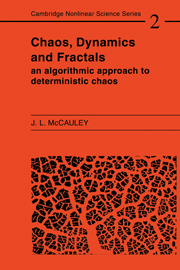Book contents
- Frontmatter
- Dedication
- Contents
- Preface
- Miscellaneous Frontmatter
- Introduction
- 1 Flows in phase space
- 2 Introduction to deterministic chaos
- 3 Conservative dynamical systems
- 4 Fractals and fragmentation in phase space
- 5 The way to chaos by instability of quasiperiodic orbits
- 6 The way to chaos by period doubling
- 7 Introduction to multifractals
- 8 Statistical mechanics on symbol sequences
- 9 Universal chaotic dynamics
- 10 Intermittence in fluid turbulence
- 11 From flows to automata: chaotic systems as completely deterministic machines
- Bibliography
- Index
9 - Universal chaotic dynamics
Published online by Cambridge University Press: 05 October 2013
- Frontmatter
- Dedication
- Contents
- Preface
- Miscellaneous Frontmatter
- Introduction
- 1 Flows in phase space
- 2 Introduction to deterministic chaos
- 3 Conservative dynamical systems
- 4 Fractals and fragmentation in phase space
- 5 The way to chaos by instability of quasiperiodic orbits
- 6 The way to chaos by period doubling
- 7 Introduction to multifractals
- 8 Statistical mechanics on symbol sequences
- 9 Universal chaotic dynamics
- 10 Intermittence in fluid turbulence
- 11 From flows to automata: chaotic systems as completely deterministic machines
- Bibliography
- Index
Summary
Invariant probability distributions from chaos
There are in nature both states and processes that are described in completely different contexts as disorderly, noisy, random, chaotic, or turbulent. An interesting example of disorder is provided by the energy-eddy cascade in fully developed turbulence which appears, at least superficially, to be a very different problem from that of the solid state disorder of a glassy state. However, there is a common thread that connects all disordered phenomena in nature: they appear as noisy, complicated patterns that require a statistical description, in stark contrast with the periodic patterns of a crystalline lattice or a laminar flow. Is the assumption of randomness fundamentally necessary for the description of certain kinds of disorder in nature? Let us begin by comparing the idea of randomness with deterministic chaos.
True randomness presumes indeterminism: given the state of a random system at one time, there is in principle and in practice no formula or algorithm from which one can predict which possible state will occur at the next instant. Or, given a pattern as the end result of a random process, there is in principle no way to predict what will be the pattern in an identical repetition of the process starting from the same initial state. The resulting uncertainty gives rise to statistics that are describable empirically by probabilities.
Information
- Type
- Chapter
- Information
- Chaos, Dynamics, and FractalsAn Algorithmic Approach to Deterministic Chaos, pp. 229 - 259Publisher: Cambridge University PressPrint publication year: 1993
